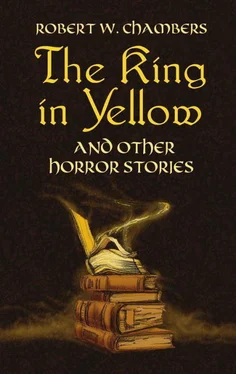As I was turning carelessly away, a slight commotion in the group of curious loiters around the gates attracted my attention. A young man had entered, and was advancing with nervous strides along the gravel path which leads to the bronze doors of the Lethal Chamber. He paused a moment before the Fates, and as he raised his head to those three mysterious faces, the pigeon rose from its sculptured perch, circled about for a few moments and flew to the east. The young man pressed his hands to his face, and then with an undefinable gesture sprang up the marble steps, the bronze doors closed behind him, and half an hour later the loiterers slouched away, and the frightened pigeon returned to its perch in the arms of Fate.
I put on my hat and went out into the park for a little walk before dinner. As I crossed the central driveway a group of officers passed, and one of them called out, “Hello, Hildred,” and came back to shake hands with me. It was my Cousin Louis, who stood smiling and tapping his spurred heels with his riding-whip.
“Just back from Westchester,” he said; “been doing the bucolic; milk and curds, you know, dairy-maids in sunbonnets, who say ‘haeow’ and ‘I don’t think’ when you tell them they are pretty. I’m nearly dead for a square meal at Delmonico’s. What’s the news?”
“There is none,” I replied pleasantly. “I saw you regiment coming in this morning.”
“Did you? I didn’t see you. Where were you?”
“In Mr. Wilde’s window.”
“Oh, hell!” he began impatiently, “that man is stark mad! I don’t understand why you——”
He saw how annoyed I felt by this outburst, and begged my pardon.
“Really, old chap,” he said, “I don’t mean to run down a man you like, but for the life of me I can’t see what the deuce you find in common with Mr. Wilde. He’s not well-bred, to put it generously; he’s hideously deformed; his head is the head of a criminally insane person. You know yourself he’s been in an asylum”
“So have I,” I interrupted calmly.
Louis looked startled and confused for a moment, but recovered and slapped me heartily on the shoulder.
“You were completely cured,” he began, but I stopped him again.
“I suppose you mean that I was simply acknowledged never to have been insane.”
“Of course that—that’s what I meant,” he laughed.
I disliked his laugh because I knew it was forced, but I nodded gaily and asked him where he was going. Louis looked after his brother officers who had now almost reached Broadway.
“We had intended to sample a Brunswick cocktail, but to tell you the truth I was anxious for an excuse to go and see Hawberk instead. Come along, I’ll make you my excuse.”
We found Hawberk, neatly attired in a fresh spring suit, standing at the door of his shop and sniffing the air.
“I had just decided to take Constance for a little stroll before dinner,” he replied to the impetuous volley of questions from Louis. “We thought of walking on the park terrace along the North River.”
At that moment Constance appeared and grew pale and rosy by turns as Louis bent over her small gloved fingers. I tried to excuse myself, alleging an engagement up-town, but Louis and Constance would not listen, and I saw I was expected to remain and engage old Hawberk’s attention. After all it would be just as well if I kept my eye on Louis, I thought, and when they hailed a Spring Street horsecar, I got in after them and took my seat beside the armorer.
The beautiful line of parks and granite terraces overlooking the wharves along the North River, which were built in 1910 and finished in the autumn of 1917, had become one of the most popular promenades in the metropolis. They extended from the battery to 190th Street, overlooking the noble river and affording a fine view of the Jersey shore and the Highlands opposite. Cafés and restaurants were scattered here and there among the trees, and twice a week military bands from the garrison played in the kiosques on the parapets.
We sat down in the sunshine on the bench at the foot of the equestrian statue of General Sheridan. Constance tipped her sunshade to shield her eyes, and she and Louis began to murmuring conversation which was impossible to catch. Old Hawberk, leaning on his ivory-headed cane, lighted an excellent cigar, the mate to which I politely refused, and smiled at vacancy. The sun hung low above the Staten Island woods, and the bay was dyed with golden hues reflected from the sun-warmed sails of the shipping in the harbor.
Brigs, schooners, yachts, clumsy ferry-boats, their decks swarming with people, railroad transports carrying lines of brown, blue and white freight cars, stately sound steamers, declassé tramp steamers, coasters, dredgers, scows, and everywhere pervading the entire bay impudent little tugs puffing and whistling officiously; these were the crafts which churned the sunlit waters as far as the eye could reach. In calm contrast to the hurry of sailing vessel and steamer a silent fleet of white warships lay motionless in midstream.
Constance’s merry laugh aroused me from my reverie.
“What are you staring at?” she inquired.
“Nothing—the fleet,” I smiled.
Then Louis told us what the vessels were, pointing out each by its relative position to the old Red Fort on Governor’s Island.
“That little cigar-shaped thing is a torpedo boat,” he explained; “there are four more lying close together. They are the ‘Tarpon,’ the ‘Falcon,’ and ‘Sea Fox’ and the ‘Octopus.’ The gun-boats just above are the ‘Princeton,’ the ‘Champlain,’ the ‘Still Water’ and the ‘Erie.’ Next to them lie the cruiser ‘Farragut’ and ‘Los Angeles,’ and above them the battle-ships ‘California’ and ‘Dakota,’ and the ‘Washington’ which is the flag-ship. Those two squatty-looking chunks of metal which are anchored there off Castle William are the double-turreted monitors ‘Terrible’ and ‘Magnificent’; behind them lies the ram, ‘Osceola.’”
Constance looked at him with deep approval in her beautiful eyes. “What loads of things you know for a soldier,” she said, and we all joined in the laugh which followed.
Presently, Louis rose with a nod to us and offered his arm to Constance, and they strolled away along the river wall. Hawberk watched them for a moment and then turned to me.
“Mr. Wilde was right,” he said. “I have found the missing tassets and left cuissard of the ‘Prince’s Emblazoned,’ in a vile old junk garret in Pell Street.”
“998?” I inquired, with a smile.
“Yes.”
“Mr. Wilde is a very intelligent man,” I observed.
“I want to give him the credit of this most important discovery,” continued Hawberk. “And I intend it shall be known that his is entitled to the fame for it.”
“He won’t thank you for that,” I answered sharply; “please say nothing about it.”
“Do you what it is worth?” said Hawberk.
“No, fifty dollars, perhaps.”
“It is valued at five hundred, but the owner of the ‘Prince’s Emblazoned’ will give two thousand dollars to the person who completes his suit; that reward also belongs to Mr. Wilde.”
“He doesn’t want it! He refuses it!” I answered angrily. “What do you know about Mr. Wilde? He doesn’t need the money. He is rich—or will be—richer than any living man except myself. What will we care for money then—what will we care, he and I, when—when——”
“When what?” demanded Hawberk, astonished.
“You will see,” I replied, on my guard again.
He looked at me narrowly, much as Doctor Archer used to, and I knew he thought I was mentally unsound. Perhaps it was fortunate for him that he did not use the word lunatic just them.
Читать дальше












